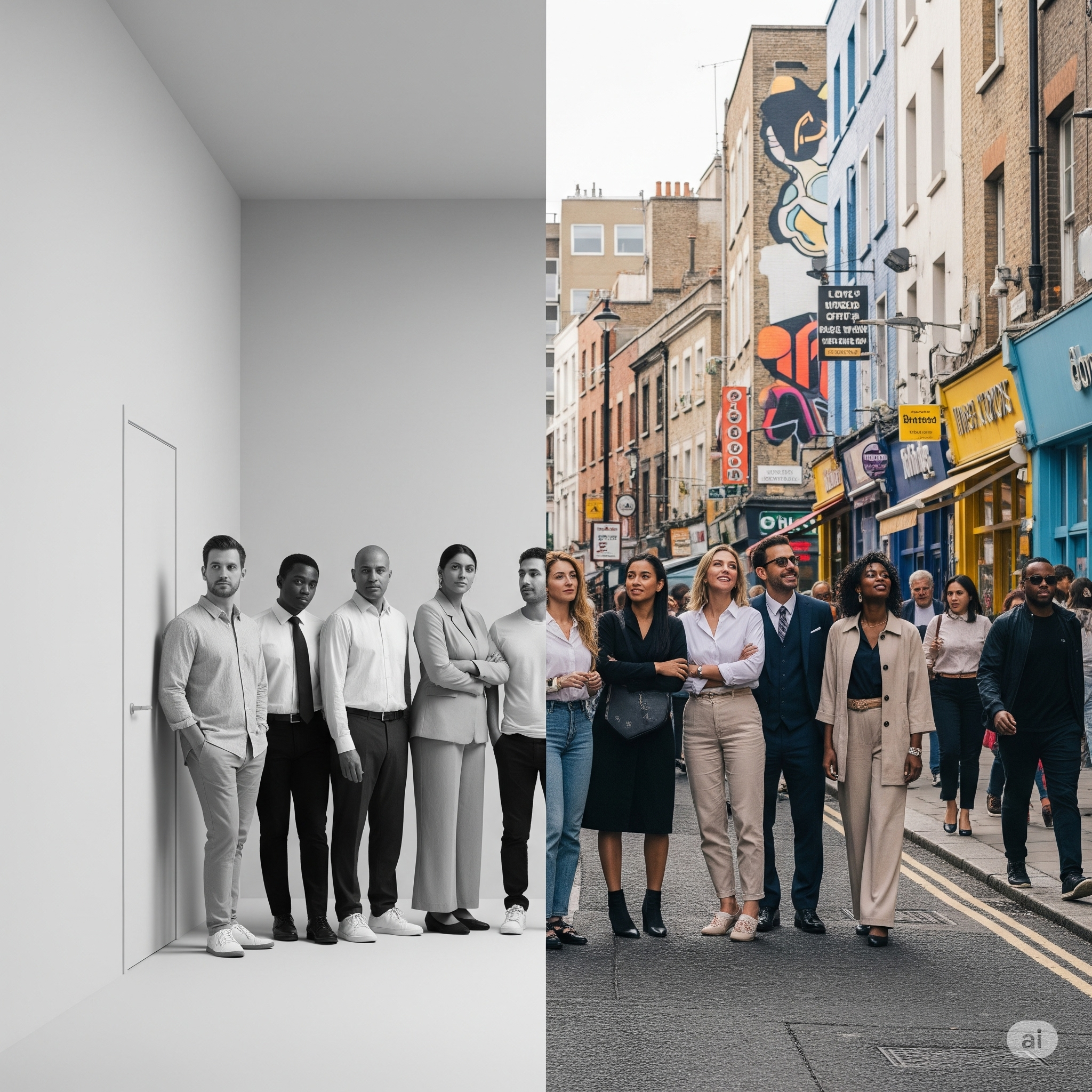The Passport Test: Are Your Leaders Global Citizens?
“It’s more important for Americans to travel right now than it ever has been. We’re a frightened society. And the most frightened people are the people with no passports, whose worldview is shaped by commercial TV news- the fear mongering commercial TV news.”
An image representing a limited cultural perspective versus a global one.
The Leadership Challenge Hidden in Plain Sight
Rick Steves wasn't just talking about vacation planning when he said this. He was identifying a leadership crisis.
Here's the challenge hidden in that quote: How can you expect your team to navigate a global marketplace if they've never navigated the globe?
Walk into any C-suite today and you'll see leaders making decisions about international markets, diverse teams, and global challenges based on a single cultural perspective. They're operating with assumptions about "how things work" that are rooted in one way of seeing the world.
The cost? Missed opportunities in international markets. Ineffective strategies for diverse teams. Solutions that work in conference rooms but fail in the real world.
But here's what research consistently shows about global leadership: there's a simple test that reveals whether your leaders are prepared for today's global challenges.
A passport with multiple stamps from different countries
The Passport Test
It's simple: Do your leaders have passports? And more importantly, have they used them for something more meaningful than business trips to familiar hotels in international cities?
Because here's what we've learned: Leaders with authentic international experience approach challenges fundamentally differently than those who've never left their cultural comfort zone.
A table contrasting leaders without global experience and leaders with global experience.
The difference isn't just professional - it's philosophical. Global citizens understand that humans everywhere are remarkably innovative, collaborative, and resilient. Local-only leaders often believe challenges are uniquely difficult because they've never witnessed how similar problems get solved across different cultural contexts.
International Retreats: Beyond Team Building to World Building
People interacting in different cultural settings
Here's why international retreat experiences create different results than domestic alternatives:
Cultural Context Immersion
Your team doesn't just visit destinations - they experience how different cultures approach work, collaboration, and problem-solving. When your CFO witnesses how Scandinavian companies approach work-life integration, she returns with expanded perspectives on employee engagement. When your operations team sees how Japanese manufacturers approach continuous improvement, they understand that excellence can look completely different than their current model.
Authentic Human Connection
Extended international experiences provide opportunities for genuine cultural exchange. Your team members aren't just observing different cultures - they're engaging with people whose life experiences and worldviews expand their understanding of human possibility.
Shared Global Perspective
When your entire leadership team experiences cultural diversity together, they develop a common language for innovation rooted in global understanding rather than local assumptions.
Removal from Echo Chambers
International travel temporarily disconnects your team from familiar information sources and social circles. In this space, they encounter different ways of thinking about common challenges.
Practical Cultural Intelligence
Leaders return with concrete examples of how other cultures successfully navigate similar business challenges, providing a toolkit of approaches beyond their original cultural framework.
The Logic Behind International Experience
When leaders gain authentic international exposure, several key shifts naturally occur:
Enhanced Cultural Intelligence: Leaders become dramatically more effective when working with diverse teams and international markets
Increased Solution Flexibility: Understanding multiple approaches to challenges reduces rigid thinking
Improved Global Team Management: Having experienced different work cultures, leaders better understand and motivate international team members
Reduced Cultural Anxiety: International experience eliminates fear-based decisions about global opportunities
Expanded Market Understanding: Direct cultural experience provides insights that market research cannot
Building Global Citizens: The Business Case
An infographic explaining the case for building global citizens
The world has changed. Your customers are global. Your competitors are international. Your talent pool is diverse. Yet many leadership teams still operate from a single cultural perspective.
Companies with globally-minded leaders consistently outperform those with locally-focused leadership in several key areas:
International market expansion success rates
Cross-cultural team performance
Innovation metrics (diverse perspectives drive creative solutions)
Employee engagement in diverse organizations
Adaptability during global disruptions
The question isn't whether global experience helps - it's whether you can afford to lead without it.
Why International Experiences vs. Traditional Retreats
Traditional Corporate Retreats:
Familiar environment reinforces existing thinking patterns
Limited exposure to different approaches
Easy to default to business-as-usual mindsets
Teams return with same cultural assumptions
International Cultural Retreats:
Unfamiliar environments stimulate new neural pathways
Direct exposure to different ways of solving similar problems
Shared global experiences create lasting perspective change
Teams return with expanded toolkit of approaches
The Practical Framework
Here's how to structure an international retreat for maximum leadership impact:
Pre-Departure Preparation
Research destinations together to build cultural context and curiosity
Set intentions focused on cultural learning, not just team building
Establish group agreements about openness to different approaches and perspectives
During the Experience
Balance structured strategic sessions with authentic cultural immersion
Encourage reflection about how different cultural approaches might apply to business challenges
Document insights about alternative problem-solving methods
Post-Return Integration
Conduct thorough debrief sessions to process cultural learnings
Create systems for applying international perspectives to current business challenges
Plan follow-up actions that incorporate global thinking into strategy and operations
The Courage to Lead Globally
A group of diverse people working together in a global setting.
Rick Steves is right - we've become a frightened society. But business leadership requires global thinking, and global thinking grows from global experience, not isolation.
When your team has engaged with diverse cultures, witnessed different approaches to similar challenges, experienced the profound creativity that exists across human communities - they return with the kind of perspective that creates fearless, globally-minded leadership.
They stop making assumptions about "how things should work" and start exploring "how things could work." They stop seeing international challenges as impossible and start seeing them as opportunities for creative collaboration.
Most importantly, they remember that humans across all cultures are remarkably adaptable, innovative, and collaborative when they understand each other.
Your leaders don't just need to be good teammates. In today's interconnected world, they need to be global citizens.
Your Next Step
The question isn't whether your team needs better dynamics - most leadership teams have functional relationships. The question is whether your team needs global perspectives.
If your international strategies feel like guesswork rather than informed decisions, if your diverse teams aren't reaching their potential, if your global opportunities feel overwhelming rather than exciting - it might be time to get your leaders out into the world.
Because in today's interconnected marketplace, leading with a single cultural perspective isn't just limiting.
It's a competitive disadvantage.
Ready to build global citizens?
Let's discuss how a carefully designed international retreat can expand your team's cultural intelligence and unlock their capacity for global leadership. Our cruise-based approach combines strategic business sessions with authentic cultural immersion across multiple destinations.
Contact us to explore how global citizenship can transform your leadership team.






